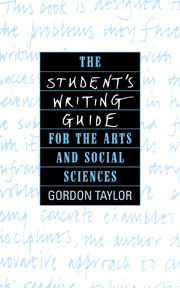Summary
This book has grown out of a writing course I have taught for some years to students of the arts and social sciences. In both I have tried to emphasise the close connections between writing in these disciplines and grappling with the problems of knowledge and understanding they present. Writing is not merely a skill we employ to record our knowledge, but the very moment at which we confront what learning and understanding are all about. So, while the reader will surely find plenty of guidance on the practical issues that arise in writing an academic essay, a search in these pages for simplified techniques that side-step the very taxing work of coming to terms with knowledge and method in these disciplines will be fruitless. My project has been to clear paths, not to indicate short cuts.
It has been my experience that many students' writing problems arise from uncertainty about what it is they are trying to say and what it is they have to do. So far as is possible in a general work of this kind, I have attempted to establish, in a variety of representative disciplines, some of the connections between issues of content and the forms of language in which the content can be realised.
- Type
- Chapter
- Information
- The Student's Writing Guide for the Arts and Social Sciences , pp. xi - xiiPublisher: Cambridge University PressPrint publication year: 1989



